Early Childhood Development: Piaget's Theories, Impact, and Critique
VerifiedAdded on 2022/08/16
|6
|1430
|16
Essay
AI Summary
This essay delves into the contributions of Jean Piaget to early childhood development, examining his theories on cognitive stages, including sensorimotor, preoperational, concrete operational, and formal operational stages. It explores Piaget's concept of schemata, assimilation, accommodation, and adaptation, and how these functions facilitate cognitive development. The essay also discusses Piaget's influence on early childhood education, emphasizing constructivist learning models and the importance of individual-based learning experiences. Furthermore, it critically appraises Piaget's theories, highlighting their impact on the field of developmental psychology and their significance in shaping educational practices. The essay concludes by summarizing the key aspects of Piaget's work and its lasting influence on understanding and supporting children's development.
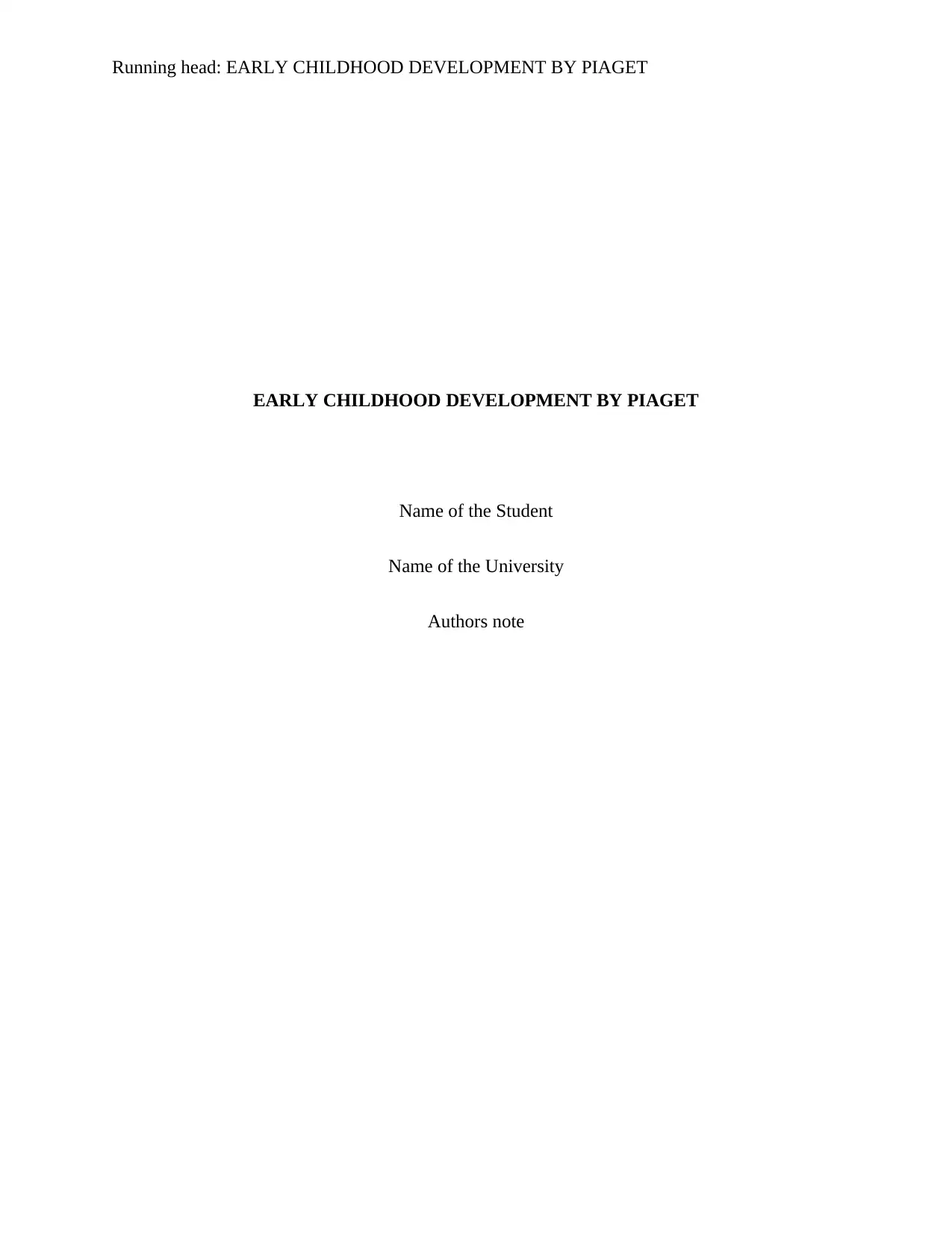
Running head: EARLY CHILDHOOD DEVELOPMENT BY PIAGET
EARLY CHILDHOOD DEVELOPMENT BY PIAGET
Name of the Student
Name of the University
Authors note
EARLY CHILDHOOD DEVELOPMENT BY PIAGET
Name of the Student
Name of the University
Authors note
Paraphrase This Document
Need a fresh take? Get an instant paraphrase of this document with our AI Paraphraser
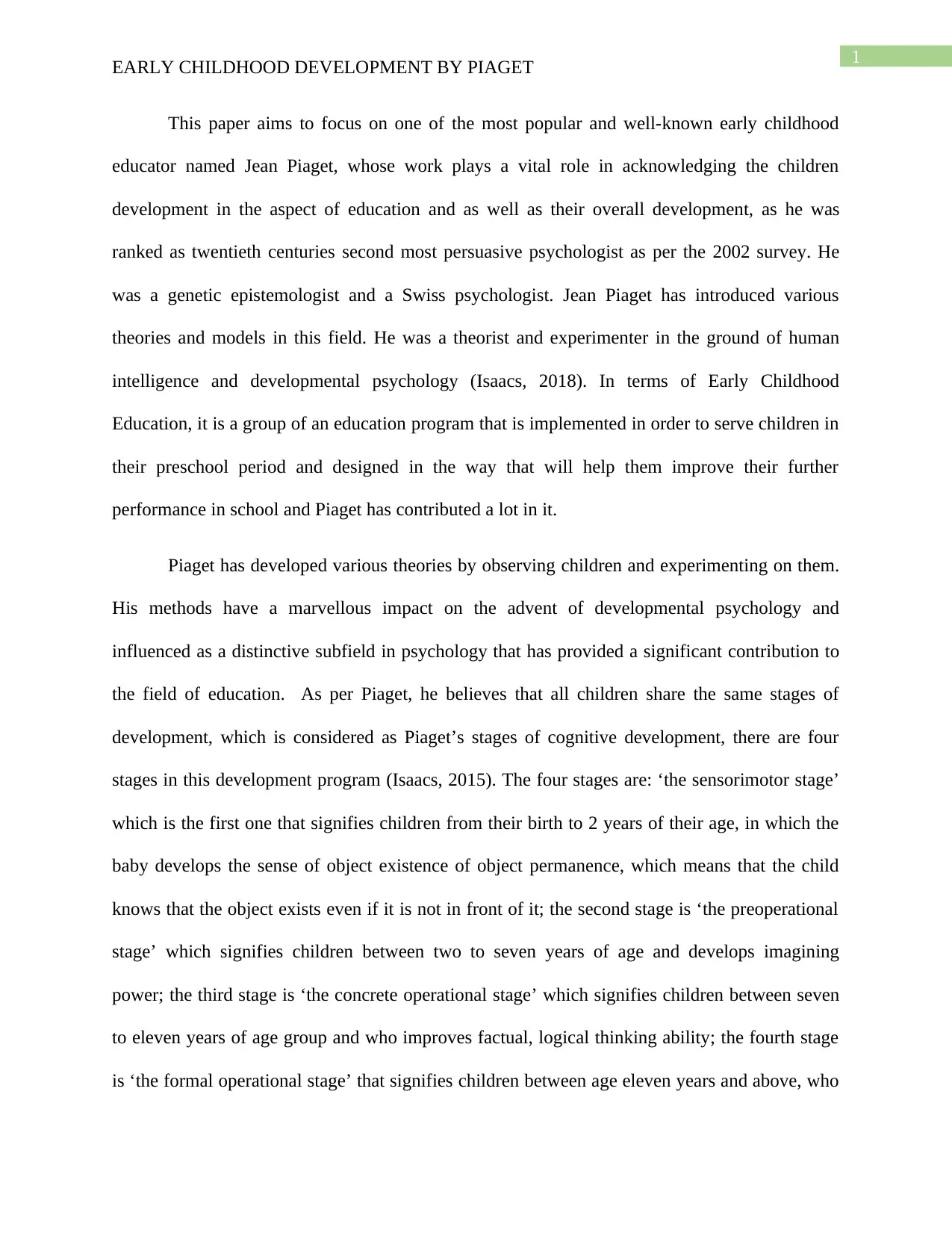
1
EARLY CHILDHOOD DEVELOPMENT BY PIAGET
This paper aims to focus on one of the most popular and well-known early childhood
educator named Jean Piaget, whose work plays a vital role in acknowledging the children
development in the aspect of education and as well as their overall development, as he was
ranked as twentieth centuries second most persuasive psychologist as per the 2002 survey. He
was a genetic epistemologist and a Swiss psychologist. Jean Piaget has introduced various
theories and models in this field. He was a theorist and experimenter in the ground of human
intelligence and developmental psychology (Isaacs, 2018). In terms of Early Childhood
Education, it is a group of an education program that is implemented in order to serve children in
their preschool period and designed in the way that will help them improve their further
performance in school and Piaget has contributed a lot in it.
Piaget has developed various theories by observing children and experimenting on them.
His methods have a marvellous impact on the advent of developmental psychology and
influenced as a distinctive subfield in psychology that has provided a significant contribution to
the field of education. As per Piaget, he believes that all children share the same stages of
development, which is considered as Piaget’s stages of cognitive development, there are four
stages in this development program (Isaacs, 2015). The four stages are: ‘the sensorimotor stage’
which is the first one that signifies children from their birth to 2 years of their age, in which the
baby develops the sense of object existence of object permanence, which means that the child
knows that the object exists even if it is not in front of it; the second stage is ‘the preoperational
stage’ which signifies children between two to seven years of age and develops imagining
power; the third stage is ‘the concrete operational stage’ which signifies children between seven
to eleven years of age group and who improves factual, logical thinking ability; the fourth stage
is ‘the formal operational stage’ that signifies children between age eleven years and above, who
EARLY CHILDHOOD DEVELOPMENT BY PIAGET
This paper aims to focus on one of the most popular and well-known early childhood
educator named Jean Piaget, whose work plays a vital role in acknowledging the children
development in the aspect of education and as well as their overall development, as he was
ranked as twentieth centuries second most persuasive psychologist as per the 2002 survey. He
was a genetic epistemologist and a Swiss psychologist. Jean Piaget has introduced various
theories and models in this field. He was a theorist and experimenter in the ground of human
intelligence and developmental psychology (Isaacs, 2018). In terms of Early Childhood
Education, it is a group of an education program that is implemented in order to serve children in
their preschool period and designed in the way that will help them improve their further
performance in school and Piaget has contributed a lot in it.
Piaget has developed various theories by observing children and experimenting on them.
His methods have a marvellous impact on the advent of developmental psychology and
influenced as a distinctive subfield in psychology that has provided a significant contribution to
the field of education. As per Piaget, he believes that all children share the same stages of
development, which is considered as Piaget’s stages of cognitive development, there are four
stages in this development program (Isaacs, 2015). The four stages are: ‘the sensorimotor stage’
which is the first one that signifies children from their birth to 2 years of their age, in which the
baby develops the sense of object existence of object permanence, which means that the child
knows that the object exists even if it is not in front of it; the second stage is ‘the preoperational
stage’ which signifies children between two to seven years of age and develops imagining
power; the third stage is ‘the concrete operational stage’ which signifies children between seven
to eleven years of age group and who improves factual, logical thinking ability; the fourth stage
is ‘the formal operational stage’ that signifies children between age eleven years and above, who
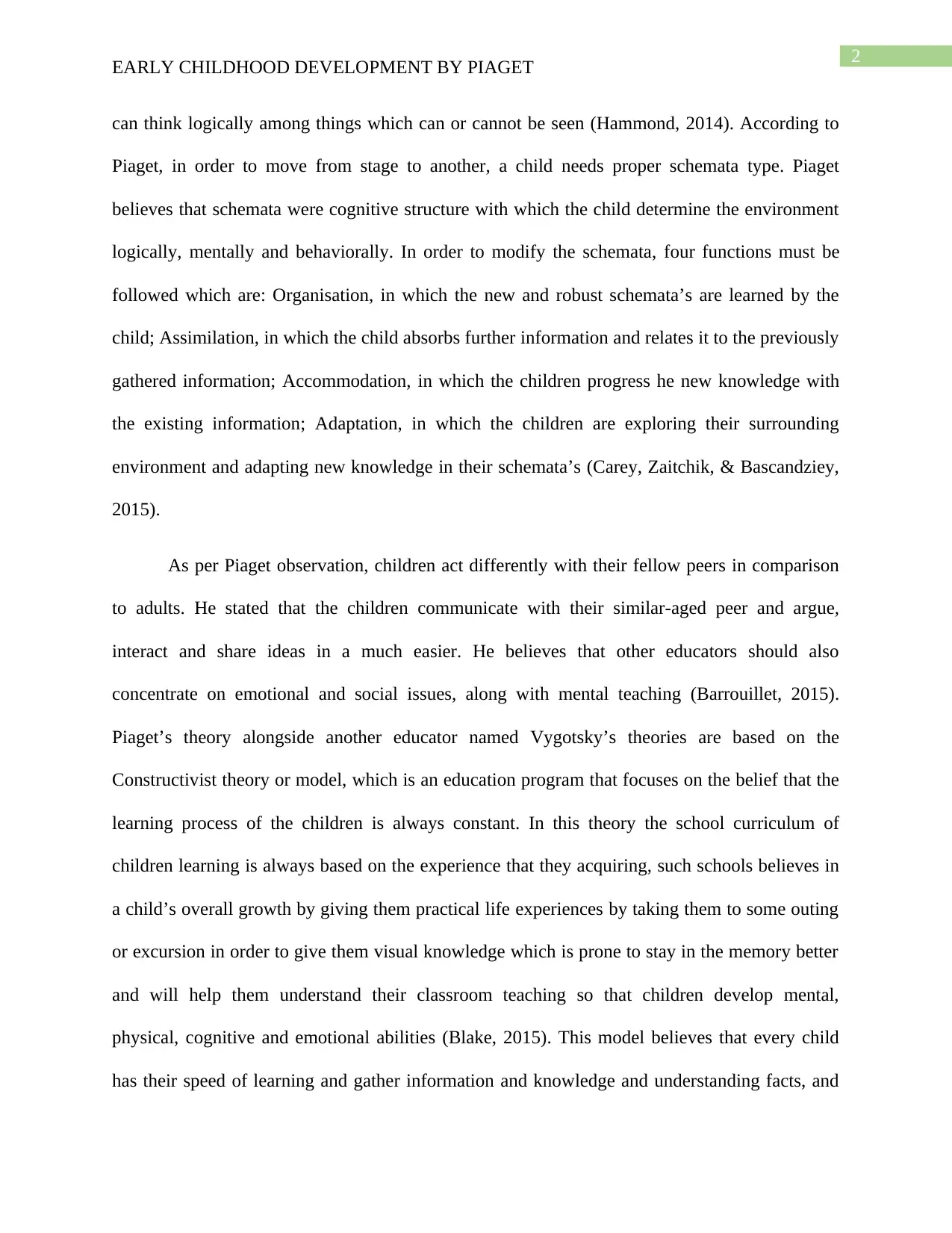
2
EARLY CHILDHOOD DEVELOPMENT BY PIAGET
can think logically among things which can or cannot be seen (Hammond, 2014). According to
Piaget, in order to move from stage to another, a child needs proper schemata type. Piaget
believes that schemata were cognitive structure with which the child determine the environment
logically, mentally and behaviorally. In order to modify the schemata, four functions must be
followed which are: Organisation, in which the new and robust schemata’s are learned by the
child; Assimilation, in which the child absorbs further information and relates it to the previously
gathered information; Accommodation, in which the children progress he new knowledge with
the existing information; Adaptation, in which the children are exploring their surrounding
environment and adapting new knowledge in their schemata’s (Carey, Zaitchik, & Bascandziey,
2015).
As per Piaget observation, children act differently with their fellow peers in comparison
to adults. He stated that the children communicate with their similar-aged peer and argue,
interact and share ideas in a much easier. He believes that other educators should also
concentrate on emotional and social issues, along with mental teaching (Barrouillet, 2015).
Piaget’s theory alongside another educator named Vygotsky’s theories are based on the
Constructivist theory or model, which is an education program that focuses on the belief that the
learning process of the children is always constant. In this theory the school curriculum of
children learning is always based on the experience that they acquiring, such schools believes in
a child’s overall growth by giving them practical life experiences by taking them to some outing
or excursion in order to give them visual knowledge which is prone to stay in the memory better
and will help them understand their classroom teaching so that children develop mental,
physical, cognitive and emotional abilities (Blake, 2015). This model believes that every child
has their speed of learning and gather information and knowledge and understanding facts, and
EARLY CHILDHOOD DEVELOPMENT BY PIAGET
can think logically among things which can or cannot be seen (Hammond, 2014). According to
Piaget, in order to move from stage to another, a child needs proper schemata type. Piaget
believes that schemata were cognitive structure with which the child determine the environment
logically, mentally and behaviorally. In order to modify the schemata, four functions must be
followed which are: Organisation, in which the new and robust schemata’s are learned by the
child; Assimilation, in which the child absorbs further information and relates it to the previously
gathered information; Accommodation, in which the children progress he new knowledge with
the existing information; Adaptation, in which the children are exploring their surrounding
environment and adapting new knowledge in their schemata’s (Carey, Zaitchik, & Bascandziey,
2015).
As per Piaget observation, children act differently with their fellow peers in comparison
to adults. He stated that the children communicate with their similar-aged peer and argue,
interact and share ideas in a much easier. He believes that other educators should also
concentrate on emotional and social issues, along with mental teaching (Barrouillet, 2015).
Piaget’s theory alongside another educator named Vygotsky’s theories are based on the
Constructivist theory or model, which is an education program that focuses on the belief that the
learning process of the children is always constant. In this theory the school curriculum of
children learning is always based on the experience that they acquiring, such schools believes in
a child’s overall growth by giving them practical life experiences by taking them to some outing
or excursion in order to give them visual knowledge which is prone to stay in the memory better
and will help them understand their classroom teaching so that children develop mental,
physical, cognitive and emotional abilities (Blake, 2015). This model believes that every child
has their speed of learning and gather information and knowledge and understanding facts, and
⊘ This is a preview!⊘
Do you want full access?
Subscribe today to unlock all pages.

Trusted by 1+ million students worldwide
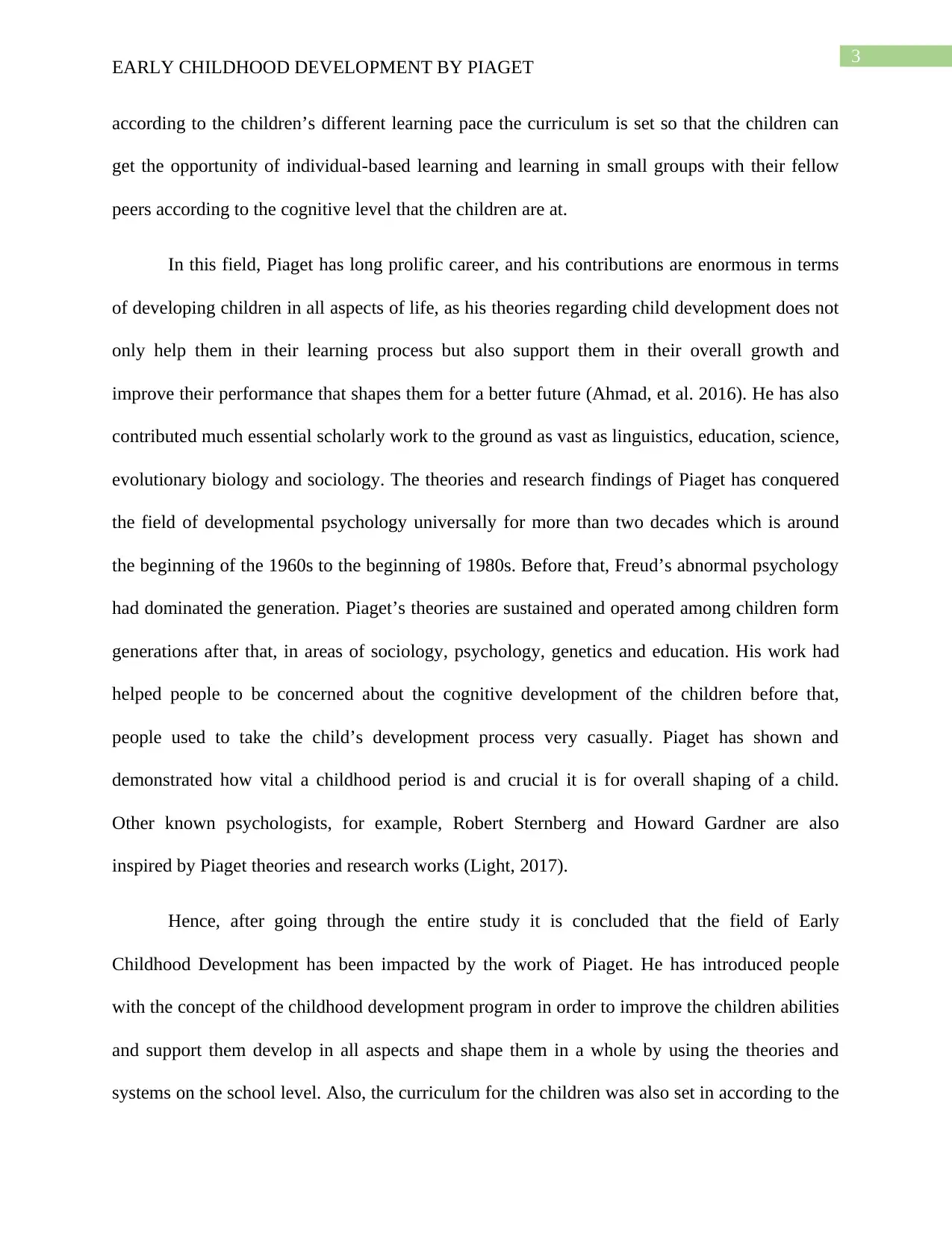
3
EARLY CHILDHOOD DEVELOPMENT BY PIAGET
according to the children’s different learning pace the curriculum is set so that the children can
get the opportunity of individual-based learning and learning in small groups with their fellow
peers according to the cognitive level that the children are at.
In this field, Piaget has long prolific career, and his contributions are enormous in terms
of developing children in all aspects of life, as his theories regarding child development does not
only help them in their learning process but also support them in their overall growth and
improve their performance that shapes them for a better future (Ahmad, et al. 2016). He has also
contributed much essential scholarly work to the ground as vast as linguistics, education, science,
evolutionary biology and sociology. The theories and research findings of Piaget has conquered
the field of developmental psychology universally for more than two decades which is around
the beginning of the 1960s to the beginning of 1980s. Before that, Freud’s abnormal psychology
had dominated the generation. Piaget’s theories are sustained and operated among children form
generations after that, in areas of sociology, psychology, genetics and education. His work had
helped people to be concerned about the cognitive development of the children before that,
people used to take the child’s development process very casually. Piaget has shown and
demonstrated how vital a childhood period is and crucial it is for overall shaping of a child.
Other known psychologists, for example, Robert Sternberg and Howard Gardner are also
inspired by Piaget theories and research works (Light, 2017).
Hence, after going through the entire study it is concluded that the field of Early
Childhood Development has been impacted by the work of Piaget. He has introduced people
with the concept of the childhood development program in order to improve the children abilities
and support them develop in all aspects and shape them in a whole by using the theories and
systems on the school level. Also, the curriculum for the children was also set in according to the
EARLY CHILDHOOD DEVELOPMENT BY PIAGET
according to the children’s different learning pace the curriculum is set so that the children can
get the opportunity of individual-based learning and learning in small groups with their fellow
peers according to the cognitive level that the children are at.
In this field, Piaget has long prolific career, and his contributions are enormous in terms
of developing children in all aspects of life, as his theories regarding child development does not
only help them in their learning process but also support them in their overall growth and
improve their performance that shapes them for a better future (Ahmad, et al. 2016). He has also
contributed much essential scholarly work to the ground as vast as linguistics, education, science,
evolutionary biology and sociology. The theories and research findings of Piaget has conquered
the field of developmental psychology universally for more than two decades which is around
the beginning of the 1960s to the beginning of 1980s. Before that, Freud’s abnormal psychology
had dominated the generation. Piaget’s theories are sustained and operated among children form
generations after that, in areas of sociology, psychology, genetics and education. His work had
helped people to be concerned about the cognitive development of the children before that,
people used to take the child’s development process very casually. Piaget has shown and
demonstrated how vital a childhood period is and crucial it is for overall shaping of a child.
Other known psychologists, for example, Robert Sternberg and Howard Gardner are also
inspired by Piaget theories and research works (Light, 2017).
Hence, after going through the entire study it is concluded that the field of Early
Childhood Development has been impacted by the work of Piaget. He has introduced people
with the concept of the childhood development program in order to improve the children abilities
and support them develop in all aspects and shape them in a whole by using the theories and
systems on the school level. Also, the curriculum for the children was also set in according to the
Paraphrase This Document
Need a fresh take? Get an instant paraphrase of this document with our AI Paraphraser
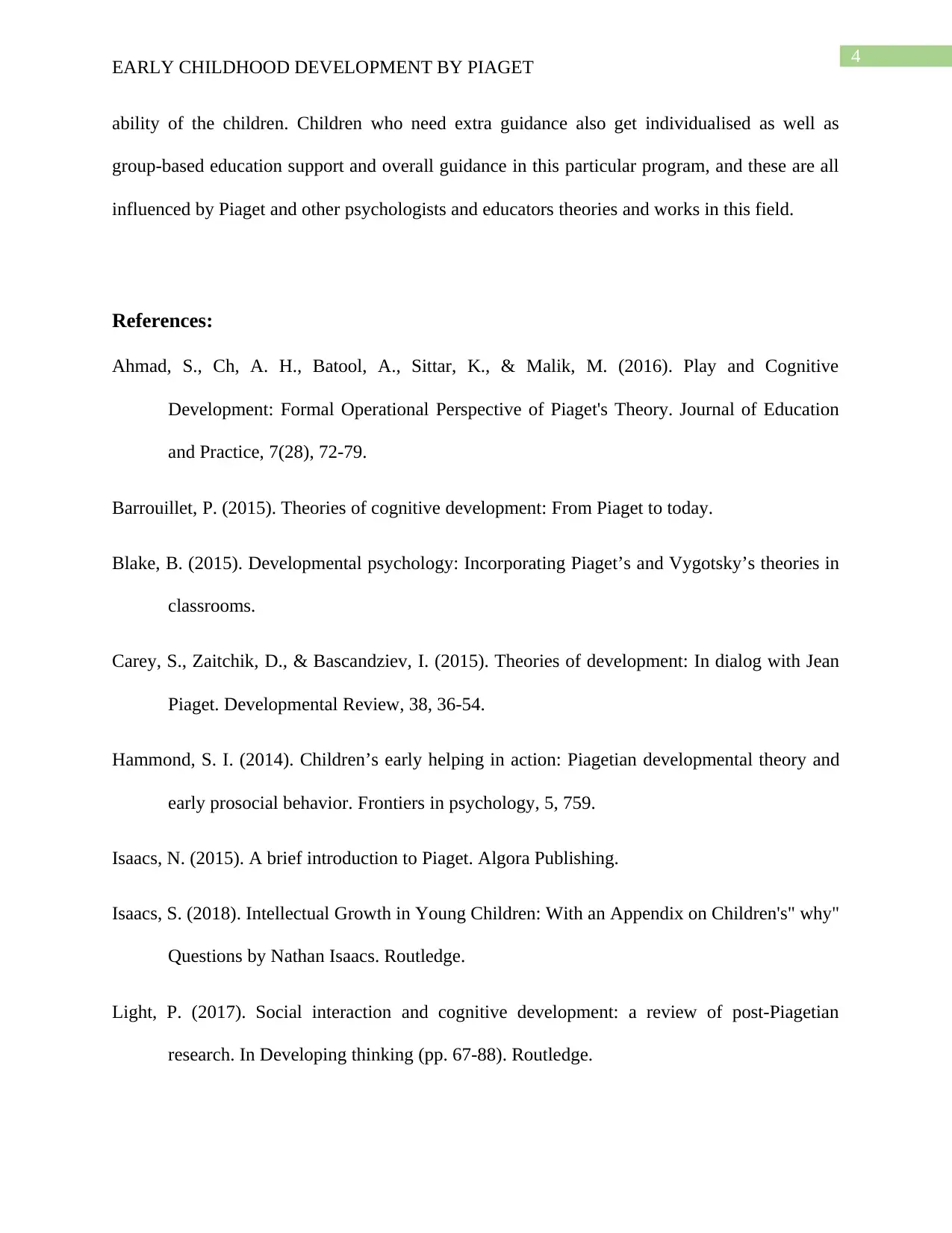
4
EARLY CHILDHOOD DEVELOPMENT BY PIAGET
ability of the children. Children who need extra guidance also get individualised as well as
group-based education support and overall guidance in this particular program, and these are all
influenced by Piaget and other psychologists and educators theories and works in this field.
References:
Ahmad, S., Ch, A. H., Batool, A., Sittar, K., & Malik, M. (2016). Play and Cognitive
Development: Formal Operational Perspective of Piaget's Theory. Journal of Education
and Practice, 7(28), 72-79.
Barrouillet, P. (2015). Theories of cognitive development: From Piaget to today.
Blake, B. (2015). Developmental psychology: Incorporating Piaget’s and Vygotsky’s theories in
classrooms.
Carey, S., Zaitchik, D., & Bascandziev, I. (2015). Theories of development: In dialog with Jean
Piaget. Developmental Review, 38, 36-54.
Hammond, S. I. (2014). Children’s early helping in action: Piagetian developmental theory and
early prosocial behavior. Frontiers in psychology, 5, 759.
Isaacs, N. (2015). A brief introduction to Piaget. Algora Publishing.
Isaacs, S. (2018). Intellectual Growth in Young Children: With an Appendix on Children's" why"
Questions by Nathan Isaacs. Routledge.
Light, P. (2017). Social interaction and cognitive development: a review of post-Piagetian
research. In Developing thinking (pp. 67-88). Routledge.
EARLY CHILDHOOD DEVELOPMENT BY PIAGET
ability of the children. Children who need extra guidance also get individualised as well as
group-based education support and overall guidance in this particular program, and these are all
influenced by Piaget and other psychologists and educators theories and works in this field.
References:
Ahmad, S., Ch, A. H., Batool, A., Sittar, K., & Malik, M. (2016). Play and Cognitive
Development: Formal Operational Perspective of Piaget's Theory. Journal of Education
and Practice, 7(28), 72-79.
Barrouillet, P. (2015). Theories of cognitive development: From Piaget to today.
Blake, B. (2015). Developmental psychology: Incorporating Piaget’s and Vygotsky’s theories in
classrooms.
Carey, S., Zaitchik, D., & Bascandziev, I. (2015). Theories of development: In dialog with Jean
Piaget. Developmental Review, 38, 36-54.
Hammond, S. I. (2014). Children’s early helping in action: Piagetian developmental theory and
early prosocial behavior. Frontiers in psychology, 5, 759.
Isaacs, N. (2015). A brief introduction to Piaget. Algora Publishing.
Isaacs, S. (2018). Intellectual Growth in Young Children: With an Appendix on Children's" why"
Questions by Nathan Isaacs. Routledge.
Light, P. (2017). Social interaction and cognitive development: a review of post-Piagetian
research. In Developing thinking (pp. 67-88). Routledge.
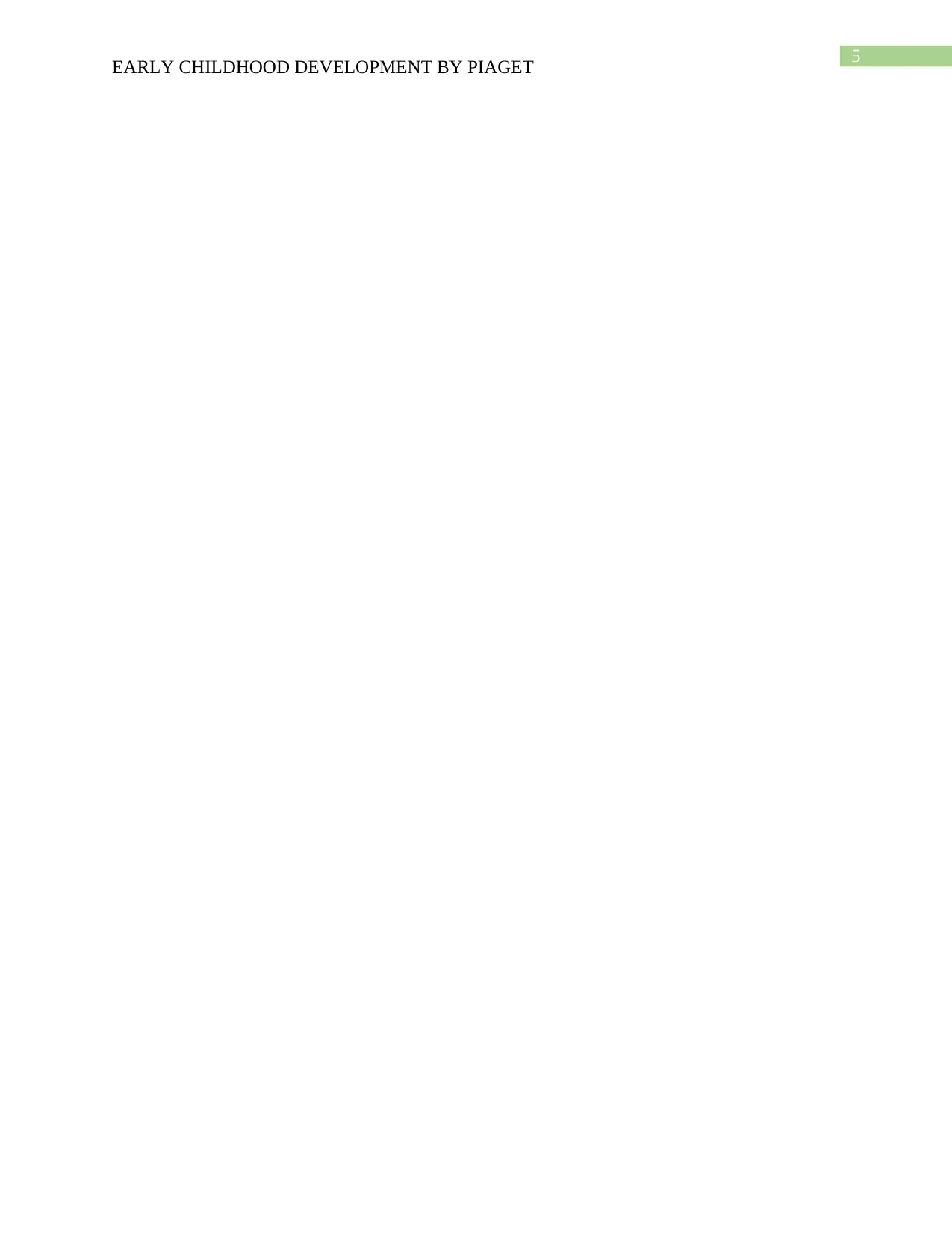
5
EARLY CHILDHOOD DEVELOPMENT BY PIAGET
EARLY CHILDHOOD DEVELOPMENT BY PIAGET
⊘ This is a preview!⊘
Do you want full access?
Subscribe today to unlock all pages.

Trusted by 1+ million students worldwide
1 out of 6
Related Documents
Your All-in-One AI-Powered Toolkit for Academic Success.
+13062052269
info@desklib.com
Available 24*7 on WhatsApp / Email
![[object Object]](/_next/static/media/star-bottom.7253800d.svg)
Unlock your academic potential
Copyright © 2020–2026 A2Z Services. All Rights Reserved. Developed and managed by ZUCOL.





